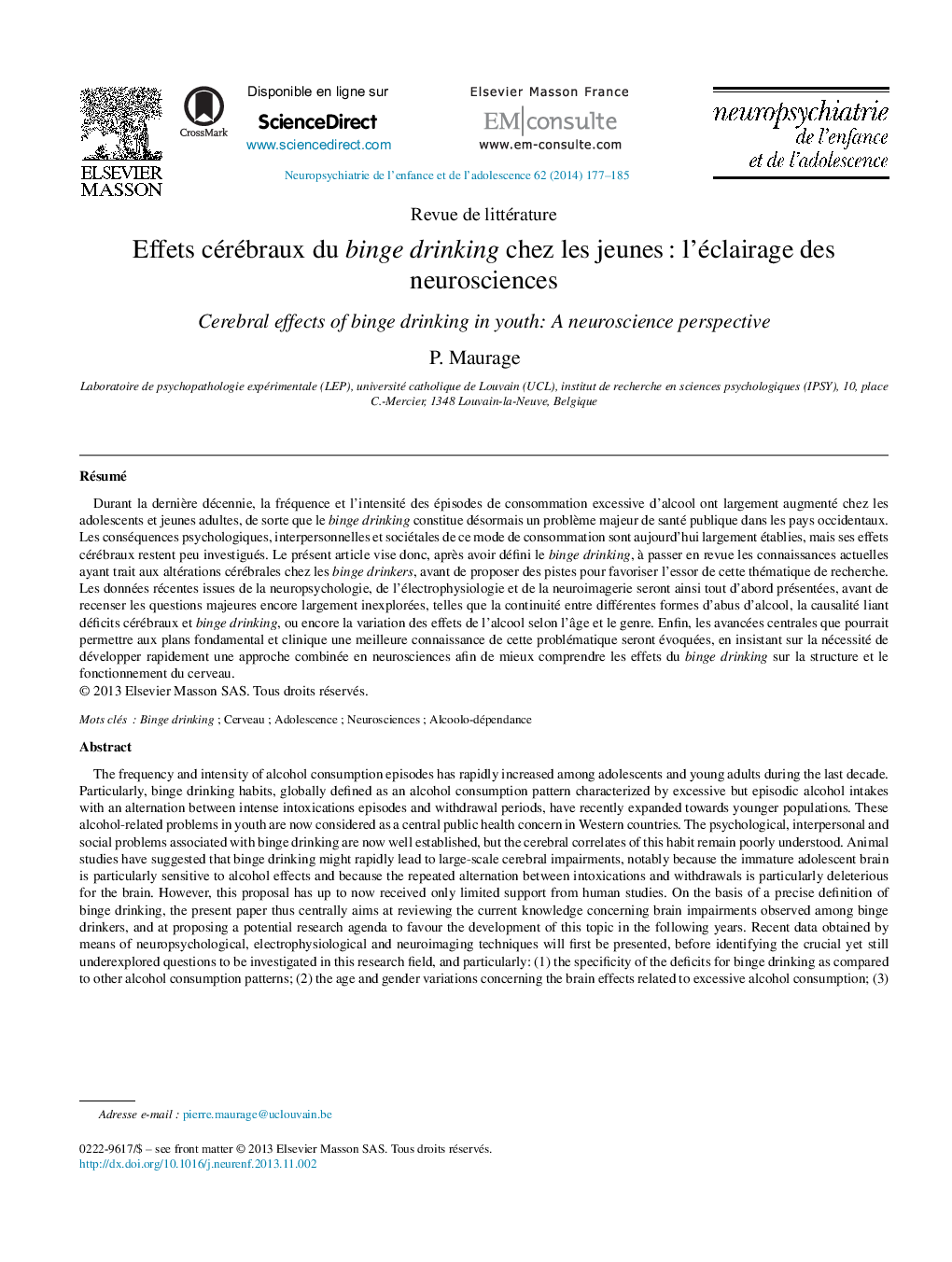| کد مقاله | کد نشریه | سال انتشار | مقاله انگلیسی | نسخه تمام متن |
|---|---|---|---|---|
| 943832 | 925563 | 2014 | 9 صفحه PDF | دانلود رایگان |

RésuméDurant la dernière décennie, la fréquence et l’intensité des épisodes de consommation excessive d’alcool ont largement augmenté chez les adolescents et jeunes adultes, de sorte que le binge drinking constitue désormais un problème majeur de santé publique dans les pays occidentaux. Les conséquences psychologiques, interpersonnelles et sociétales de ce mode de consommation sont aujourd’hui largement établies, mais ses effets cérébraux restent peu investigués. Le présent article vise donc, après avoir défini le binge drinking, à passer en revue les connaissances actuelles ayant trait aux altérations cérébrales chez les binge drinkers, avant de proposer des pistes pour favoriser l’essor de cette thématique de recherche. Les données récentes issues de la neuropsychologie, de l’électrophysiologie et de la neuroimagerie seront ainsi tout d’abord présentées, avant de recenser les questions majeures encore largement inexplorées, telles que la continuité entre différentes formes d’abus d’alcool, la causalité liant déficits cérébraux et binge drinking, ou encore la variation des effets de l’alcool selon l’âge et le genre. Enfin, les avancées centrales que pourrait permettre aux plans fondamental et clinique une meilleure connaissance de cette problématique seront évoquées, en insistant sur la nécessité de développer rapidement une approche combinée en neurosciences afin de mieux comprendre les effets du binge drinking sur la structure et le fonctionnement du cerveau.
The frequency and intensity of alcohol consumption episodes has rapidly increased among adolescents and young adults during the last decade. Particularly, binge drinking habits, globally defined as an alcohol consumption pattern characterized by excessive but episodic alcohol intakes with an alternation between intense intoxications episodes and withdrawal periods, have recently expanded towards younger populations. These alcohol-related problems in youth are now considered as a central public health concern in Western countries. The psychological, interpersonal and social problems associated with binge drinking are now well established, but the cerebral correlates of this habit remain poorly understood. Animal studies have suggested that binge drinking might rapidly lead to large-scale cerebral impairments, notably because the immature adolescent brain is particularly sensitive to alcohol effects and because the repeated alternation between intoxications and withdrawals is particularly deleterious for the brain. However, this proposal has up to now received only limited support from human studies. On the basis of a precise definition of binge drinking, the present paper thus centrally aims at reviewing the current knowledge concerning brain impairments observed among binge drinkers, and at proposing a potential research agenda to favour the development of this topic in the following years. Recent data obtained by means of neuropsychological, electrophysiological and neuroimaging techniques will first be presented, before identifying the crucial yet still underexplored questions to be investigated in this research field, and particularly: (1) the specificity of the deficits for binge drinking as compared to other alcohol consumption patterns; (2) the age and gender variations concerning the brain effects related to excessive alcohol consumption; (3) the causal link between cerebral impairments and binge drinking habits, with the proposal that some brain changes might precede the appearance of binge drinking; (4) the continuity between the successive stages of alcohol-related problems, from alcohol abuse in binge drinking to alcohol-dependence; (5) the proposal that a cerebral compensation might take place in the first stages of binge drinking, some brain regions being activated during cognitive tasks to compensate for altered activations in other brain areas. Finally, the major implications that could be allowed by a better understanding of this issue at theoretical and clinical points of view will be underlined. A particular emphasis will be put on the critical need to rapidly develop a combined neuroscience approach in order to further identify the structural and functional effects of binge drinking habits on the brain.
Journal: Neuropsychiatrie de l'Enfance et de l'Adolescence - Volume 62, Issue 3, May 2014, Pages 177–185